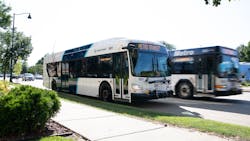MetroForward is Madison mayor’s plan to boost public transit ridership, stay ahead of municipal growing pains
A proposed rapid transit plan for Madison, Wis., aims to speed workforce transportation, reduce congestion and drive times, as well as situate transportation as the backbone to the regional economy.
Mayor Satya Rhodes-Conway’s MetroForward calls for an investment of more than $200 million of which two-thirds will be focused on Bus Rapid Transit development with the remaining one-third going toward critical facility needs. The plan, says Mayor Rhodes-Conway, will help the region continue its rapid growth while avoiding pitfalls, such as increased congestion, experienced by cities in similar situations.
“Dane County is at a pivot point. By the year 2050, there will be an additional 85,000 new jobs, 100,000 new residents and an additional 800,000 road trips. Congestion is predicted to double. We can’t have a superhighway through the Isthmus. We need to get ahead of this growth now and build a modern rapid transit infrastructure that lifts our growing economy and does not slow it down,” said Mayor Rhodes-Conway.
Madison’s Department of Transportation says if cars made up all these additional 800,000 road trips, it would require adding two or more lanes to the main roads on the Isthmus and a doubling of parking in the downtown area.
“We could pursue the path of expanding our major roads and building 10,000 new parking spots on the Isthmus, but the cost to taxpayers would be staggering, hundreds of millions for road expansions -- $250 million for the parking alone. Rapid transit is simply the best option to connect people with jobs on the Isthmus and in the larger Dane County region,” said Mayor Rhodes-Conway.
The MetroForward plan takes a four-step approach to reaching the end goal of improving access and reducing travel times:
Expand Accessibility and Service: MetroForward would subsidize additional passes for riders and families in need, provide free summer youth passes for eligible students, enhance weekend and evening service and add new routes to south-side educational institutions and surrounding communities.
Modernize Metro Facilities to Serve the Growing Region: The city says Metro Transit’s main facility is too small for its current fleet of buses and needs repairs and safety upgrades. The plan calls for a $40 million renovation to take place over two years that would expand capacity of the facility to field 218 buses (up from the current 160), build a satellite facility, new maintenance bays and new electric charging stations.
Focus on Sustainability: The city has a goal to become carbon neutral by the end of 2030. Metro Transit will pilot all-electric buses in 2020 with full fleet conversion anticipated to begin in 2023.
Implement BRT: The city would like to invest more than $130 million to develop BRT using dedicated lanes, modern platforms, pre-paid ticketing stations, larger buses and other improvements. The city says Metro riders could see a reduction in travel times by up to 25 percent. The city says more than 80,000 residents and nearly 120,000 jobs lie within a 10-minute walk of the proposed BRT routes.
Madison is pursuing many funding sources for the project’s local share, including other federal and state grants, local partnerships and internal funding sources. In fall of 2019, the city will formally request entry into the federal Small Starts “project development” phase. This is a requirement of the Federal Transit Administration (FTA) to continue planning for BRT, and is an important first step, working toward a federal transit grant to build Phase 1 of the system.
The city of Madison cites the following benefits that could be realized through the enhancement of rapid transit:
- It is the most efficient way to connect people with jobs. On East Washington, inbound buses make up less than one percent of the traffic capacity yet carry 11 percent of the people.
- Enhancing Metro service on weekends and evenings allows 2nd and 3rd shift workers to more easily get to work and allows families to run the weekend errands they need.
- MetroForward makes transportation more equitable, helping families make ends meet. The yearly cost of a Metro pass is just one-tenth the cost of owning a car.
- Increasing Metro ridership by 20 percent has the same carbon reduction power as planting 140,000 trees.
- Bus rapid transit is the most feasible and reasonable solution to address regional congestion challenges. Metro currently provides 13 million rides per year. Other solutions, such as rail or continued auto dependence, are two to seven times more expensive.
- Bus rapid transit will provide fast, frequent, reliable service that is not impacted by congestion. The planned transit project will reduce transit travel times by up to 25 percent.

Mischa Wanek-Libman | Group Editorial Director
Mischa Wanek-Libman is director of communications with Transdev North America. She has more than 20 years of experience working in the transportation industry covering construction projects, engineering challenges, transit and rail operations and best practices.
Wanek-Libman has held top editorial positions at freight rail and public transportation business-to-business publications including as editor-in-chief and editorial director of Mass Transit from 2018-2024. She has been recognized for editorial excellence through her individual work, as well as for collaborative content.
She is an active member of the American Public Transportation Association's Marketing and Communications Committee and served 14 years as a Board Observer on the National Railroad Construction and Maintenance Association (NRC) Board of Directors.
She is a graduate of Drake University in Des Moines, Iowa, where she earned a Bachelor of Arts degree in Journalism and Mass Communication.

